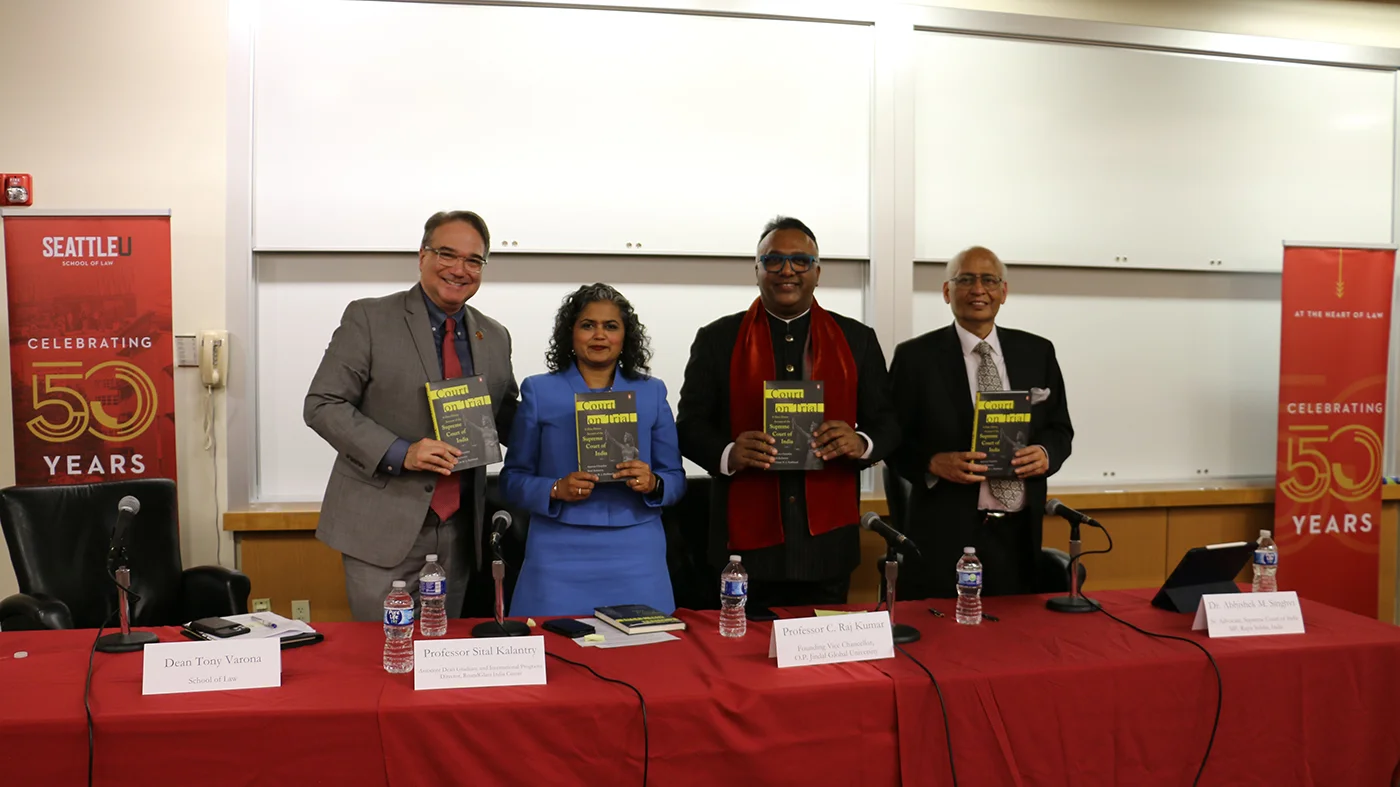Seattle University School of Law, in collaboration with the RoundGlass India Center, welcomed Dr. Abhishek Manu Singhvi, a member of the Parliament of India and India's leading Supreme Court litigator, to explore how the Supreme Court of the world’s largest democracy — India — has functioned since its founding 75 years ago. Singhvi’s address, “The Indian Supreme Court at 75: Protecting Rights, Expanding Freedoms, and Empowering Citizens,” was sponsored as an October segment of the Dean’s Luminaries in Law Lecture & Conversation Series.
The lecture included a larger panel consisting of Professor C. Raj Kumar, founding vice chancellor of Jindal Global University and a leader in Indian higher education, Dean Anthony E. Varona, who moderated, and Professor Sital Kalantry, director of the RoundGlass India Center, who gave concluding remarks. The event marked the international launch of Kalantry's new co-authored book, "Court on Trial: A Data-Driven Account of the Indian Supreme Court."
“I am thrilled that today’s Luminaries in Law event brings together here at Seattle University School of Law the most prominent Supreme Court litigator in India today with the most prominent legal educator in India today,” Varona said in his opening remarks.
Singhvi, a senior advocate at the Supreme Court of India, has argued many of the most consequential cases decided by the court, including recently advocating for same-sex marriage (which the court decided not to legalize). He gave a history of the country’s establishment of democracy after British colonial rule, noting that “out of the 30 or 40 countries that emerged from the yoke of imperialism between the 1930s and 1960s, India is the only country that has remained a functioning, vibrant democracy, 75 years later.”
“When we look at the Supreme Court, we have to admire the fact that it has retained, broadly, its shine and glow,” Singhvi said. “Indian democracy has not only survived, but prospered and matured.”
Professor Kalantry’s newest book was referenced several times during the lecture.
“Given the fact that the Indian Supreme Court is the court of last resort for almost 20% of the world’s population, there have been relatively few empirical studies of the Court published,” Kalantry said. “My co-authors and I started this project over a decade ago to better understand the inner workings of the Supreme Court using sophisticated data analysis.”
Singhvi agreed, noting that the Indian Supreme Court has its own “aberrations and not-so-great moments” to work out. For example, he said, because justices must retire from the court at 65, some justices use their decisions to favor certain government members so they can obtain post-retirement appointments — a problem that he called “post-retirement desires affecting pre-retirement judges.”
“These are the issues which will of course always arise, but which are nevertheless fundamental to the institution of the Supreme Court as it goes from its 75th to its 100th birthday,” he said. “We’re not a perfect democracy by any means, but we are in the right direction, with the right momentum.”
Kumar talked about the important part that the Supreme Court plays in helping the other parts of India’s government to uphold democracy.
“What the Supreme Court of India has done over the years is not only recognize its own role in the institutional development of democracy using principles of constitutionalism in advancing that vision, but also empower other democratic institutions in India which are critical for strengthening that democracy,” he said.
A video of the event can be found here.
This Luminaries in Law Series brings to Seattle U Law nationally and internationally preeminent leaders from law practice, the judiciary, government, and the corporate world, to share their bold ideas about the future of law and the legal profession.

